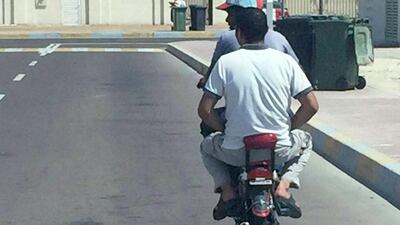ABU DHABI // Safety experts are calling for stiffer penalties and stricter policing of motorcycle riders who break the law.
Last week, the Ministry of Interior’s security media department highlighted bad practices of riders when it released a picture of two men on a motorbike – neither of whom had a helmet.
The bike appeared to have no rear licence plate and the indicator lights were missing.
The rear tyre was underinflated and the weight of the pillion passenger could have made the motorbike unstable. And both men were in sandals.
The photo was taken on the streets of Abu Dhabi.
“This rider and his pillion passenger are completely flouting the law and putting themselves at great risk,” said Robert Hodges, chief operating officer at the Emirates Driving Institute in Dubai.
“The motorcycle population on the roads is not high but they do form a large part of the road casualties and deaths in the UAE due to the vulnerability of any rider in an accident.”
Bikers who do not wear a helmet risk a Dh200 fine and four black points on their licence.
Mr Hodges, a qualified driver education and road-safety expert, suggested “more active policing, more corrective training for offenders, licence suspension, and retraining and retesting for repeat offenders”.
“Enforcement is not strict enough,” agreed Salaheddine Bendak, associate professor of industrial engineering at the University of Sharjah.
“The penalties are not really a deterrent as they are fairly low. Awareness campaigns are not enough when compared to other countries.”
Yasser Al Hweety, a director of the Abu Dhabi chapter of Harley-Davidson Owner’s Group, said that while most riders in the city complied with the law, there were many who did not.
Mr Al Hweety is concerned about those under the age of 18 who ride scooters without wearing proper headgear.
“Some people are wearing plastic helmets which are small and ill-fitting,” he said. “In an accident, your helmet won’t protect you if it is not of good quality and doesn’t fit properly.”
Emirates Driving Institute provides theory and safety lectures, and manoeuvring and on-road training. Defensive riding courses are also being offered to licensed riders.
“After passing their motorcycle test, many riders seem to ignore the safety rules and recommendations we have given them,” Mr Hodges said. “It is very frustrating.”
Students at the institute must wear proper shoes or boots. Hard-wearing trousers, elbow and knee pads must also be worn during training so that limbs and body joints are protected.
Gloves or mitts must worn to help grip the handlebars and controls, and to protect the hands in the event of a fall.
A full-face crash helmet that is ISO approved must be fastened with a strap, with the visor down at all times. If a visor is not fitted to the helmet, a pair of motorcycle goggles must be worn, Mr Hodges said.
The UAE does not have a law on motorcycle helmet standards.
rruiz@thenational.ae

